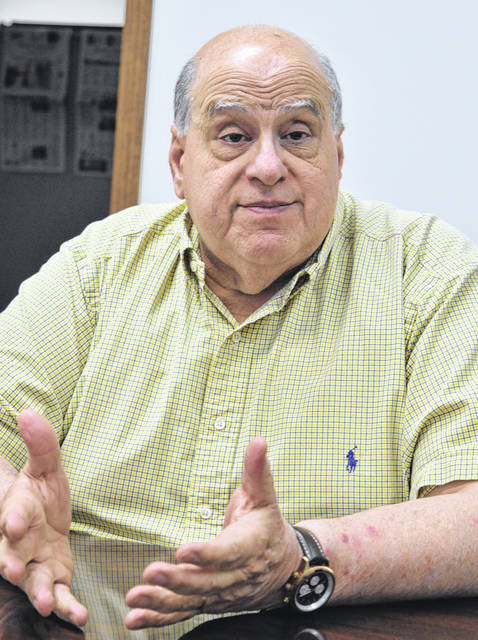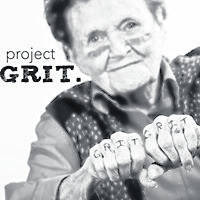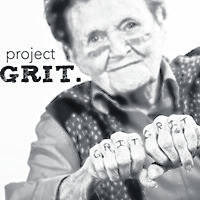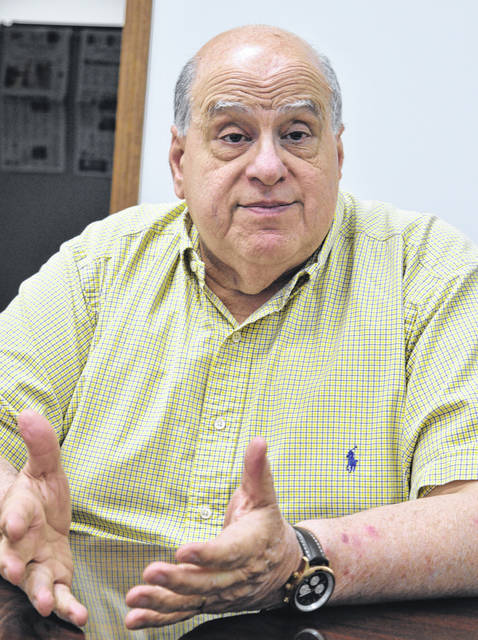



WILMINGTON — Ten years ago, one in three households in town had someone who worked at the DHL Air Park.
“You can talk about everything else, but the impact on people and their lives and what are they going to do was the thing that gnawed at me most of all. That’s what I would carry to bed with me every night and that’s why I didn’t sleep very well for several years,” said David Raizk. Raizk was mayor of Wilmington when DHL withdrew from the domestic U.S. parcel shipping market.
He was the mayor when more than 8,100 jobs based at the air park were lost.
One of the things Raizk said he’s most proud of is the more than $10 million in federal job training funds that were secured for former air park employees who were without a job.
The retraining was critical, he believes, and he thinks it really has helped with the recovery in the area, in addition to helping the people who were retrained.
It’s hard to judge, however, because some people received retraining and then got jobs elsewhere.
“I would be interested in seeing how that [retraining] impacted things, to see some quantification about how that really impacted things,” Raizk said in a recent interview marking the 10-year anniversary of the city’s jobless crisis.
An Associated Press report in September 2009 stated workers displaced from the air park had gotten funding for retraining from multiple sources, including a national emergency grant. They were attending five dozen schools and training centers, including Ohio State, the University of Cincinnati, Xavier University, community colleges and technical schools. Some workers were even going to school in Kentucky because many retraining classes in the layoff zone were full, the Associated Press reported.
The city’s population number of 12,500 has remained relatively stable since the latest census in 2010, said Raizk.
“I thought that was the greatest testament to our community that there could be. That even though some opportunities disappeared, the people didn’t disappear. They liked living in Wilmington. I know some people left, but that fact [population numbers] alone indicates a stability that a lot of communities haven’t had in the past,” Raizk said.
In that connection, he recalled an illuminated HoliDazzle parade — perhaps in 2009 — with Randy Riley as emcee and the streets packed and the temperatures cold. “On the platform Randy asked, ‘Does this look like a ghost town to you?’ and the crowd just goes crazy.”
Raizk said he saw his role at the time of the crisis as threefold: Keep Wilmington on page 1 around the country for leverage; use his ability as a negotiator; and marshal the resources the community would undoubtedly need by pounding on every elected or appointed official’s door to seek a hand-up — not hand-outs, as the phrase at the time put it.
As long as the city occupied the forefront for the news media, the chances were better for DHL to donate the air park, to receive assistance from Washington, D.C. and Columbus, maybe even to grab the attention of a potential employer although the general economy was also turning weak with the simultaneous onset of the Great Recession.
As an example of him trying to use his strengths as a negotiator, Raizk talked about his response to DHL’s bombshell news — an announcement he heard in person at parent corporation Deutsch Post headquarters in Germany.
He told company officials he had to have a meeting with the head of the corporation as soon as possible, and he got it that afternoon with John Mullen, one-on-one, in Mullen’s office on the 43rd floor. Raizk had three questions. First, “Do you have an actual deal with UPS?” Mullen’s reply was that he was “confident” those two parties had something. Second, “Is there any chance you’ll stay in Wilmington, anything we can renegotiate to keep you there?” and Mullen said no, we’re leaving.
And Raizk’s third question to the Deutsche Post executive, “Well, given those things, is there any chance you would consider giving back the airport from whence it came?” (Raizk said he mentally kicked himself at the time for using that archaic language), and Mullen answered that’s a possibility, I’m thinking something can be worked out.
“I guess my feeling was, since I negotiate for a living, I needed to walk out of there with something I could hang my hat on, had to have something that I latched onto like a pit bull, and that was to get the airport back and he was very candid, they really didn’t need another property,” Raizk recalled.
He said he felt the air park was “just too valuable a resource, with too much community investment both emotionally and financially” to not get control of it.
That belief also served as something of the basis for both of Raizk’s congressional testimonies: If they’re leaving, then they owe the community the airport so that it can be redeveloped.
City Hall and its budget
In addition to the impact on the many unemployed residents, the negative impact on city government was a great concern for Raizk, though secondary to the hardships of people.
With so many Wilmingtonians jobless, the revenue from the city’s income tax would inevitably fall off.
Fortunately, the air park had been annexed into the city limits after DHL arrived but before it left, providing a boost to the city coffers that would serve as a cushion for city hall and municipal services, at least for a while.
“Unfortunately, there wasn’t enough political will to raise the earnings tax when it should have been raised,” remarked Raizk who was defeated in a close election in fall 2011. Raizk said in his interview that if he had been re-elected, he was going to seek a raise in the earnings tax “first thing out of the box.”
He noted that the new mayor, Randy Riley, formed a blue-ribbon commission which recommended an increase in the earnings tax.
A municipality has to have revenue, said Raizk. After several years, the earnings tax was raised to 1.5 percent, something he applauds.
“But I just hate to see all those lost years. We got to make the town look sharp because you can’t develop when you look like you’re ready to throw in the towel,” he said.
The former mayor said Wilmington now has workforce issues of a different sort than it did 10 years ago.
Job creation is something that people always talk about, he said, but he thinks workforce development is probably more key right now — to pursue having qualified people for jobs.
“If you have the qualified people, the jobs will come I think. We got to focus on workforce development, training and education, to have the kind of workers that people need. And that’s tough, but that’s got to be a driving force. So now we have jobs but not as many qualified candidates to fill the jobs,” he said.
David and Goliath? Small town defeats UPS, Raizk says
Raizk feels that this community did win a battle in 2008.
“I want people to know that this community was able to defeat the UPS deal. All the efforts, whether by the workers, the unions, the media attention — all of that stuff beat that deal. They backed away. We won that battle, the community won that battle; but they don’t know that they won that battle.”
A town with grit
DHL of course did leave Wilmington. But many, many people stayed around — and many who left for an income preferred to stay.
“Hey, it’s home. It’s home for you and me,” Raizk said during the interview. “We’re not leaving and I think a lot of people feel that way.”
Reach Gary Huffenberger at 937-556-5768.



